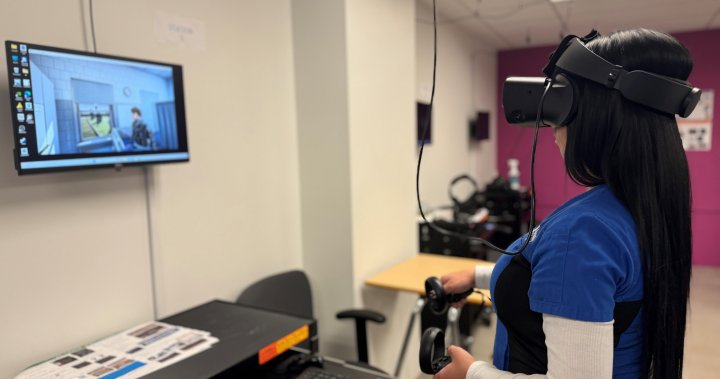In Alberta, traditional nursing education is getting a high-tech makeover thanks to life-like mannequins like Alex in the Bow Valley College simulation lab.
These mannequins, equipped with breathing, blinking and speaking capabilities, are shaping the future of nursing education.
Bow Valley College stands at the forefront of this innovation, utilizing these advanced mannequins to prepare practical nursing students for real-life scenarios at patient bedsides.
Job vacancies for licensed practical nurses have nearly tripling in just two years, according to Statistics Canada. But colleges and universities are adapting to provide students with adequate training opportunities.
The college incorporates various teaching methods, including simulation labs, virtual reality sets, and AI-enabled mannequins, to enhance the learning experience.
The latest health and medical news
emailed to you every Sunday.
This comprehensive approach has proven beneficial for students like Samantha Myles, who credits the combination of in-person learning and technology for boosting her confidence as she transitions from student to nurse.
“It’s a safe, risk-free environment to learn,” said Myles. “It puts your anxiety at ease.”
Bow Valley College is leading the digital revolution in nursing education by replacing up to 30 per cent of clinical hours with simulation labs and virtual reality.
This program, the largest of its kind in Canada, is ensuring that future nurses are well-prepared to meet the demands of a tech-driven healthcare environment.
When the college introduced the VR platform after winning a research grant with ICOM Productions, students went from assessing healthy classmates and waiting for patients with conditions in clinical placements to immersive learning in the simulation environment.
“Once these nurses enter the workforce, they are exclusively using technology,” said Clare Howland, Clinical & Simulation Program Chair at Bow Valley College. “They will be using electronic health records, electronic medical carts, apps on phones and more.”
Noting the province-wide shortage of nurses, Howland also says there is less opportunity to new nurse to have mentors, and find placements to get the proper amount of clinical hours required in order to graduate. That’s where technology fills the gap, and program leaders say hope that their methods will be adopted across Canada.
© 2024 Global News, a division of Corus Entertainment Inc.




